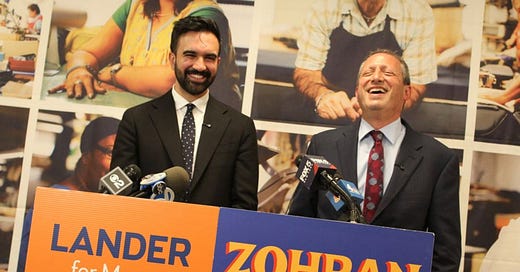PR is the 'Politics of the Future'
Ranked choice voting fundamentally shifted the dynamics of New York's Mayoral primary race – imagine what it could do on a national scale in the US or UK.
The United States has long shown us the very worst of what First-Past-The-Post (FPTP) politics can offer. Trapped in a broken two-party system, an overwhelming 80% of Americans say politicians don’t care what they think. Elections often become desperate, winner-takes-all bids to be the least offensive option on the table.
But a stunning primary upset in the race to be New York City’s next mayor offers a glimpse of something different.
Zohran Mamdani, polling at just 1% in February, won the Democratic nomination this week with 44% of the vote. His opponent, Andrew Cuomo – the scandal-tainted scion of a powerful New York political dynasty – had raised a record-breaking $25 million in donations, some of it from Trump-aligned billionaires. Mamdani, by contrast, built his campaign on small-dollar donations, the vast majority under $100.
A Campaign for Something
There are many compelling stories behind Mamdani’s victory. He ran a campaign I’d call “positive populism”: presenting himself as outside the machine, a break from corrupt politics-as-usual. He offered popular, concrete policies - free city buses, a rent freeze for tenants - and explained exactly how he’d implement them. His campaign mastered social media, with wildly viral videos that reached my feed here in the UK.
But what’s been under-discussed is how New York’s recently adopted ranked choice voting system helped make all of this possible. It didn’t just change how votes were counted, it transformed how the campaign itself unfolded.
The Ranked Choice Advantage
Ranked choice voting (RCV) lets voters rank candidates in order of preference instead of picking just one. If no candidate gets a majority of first-choice votes, the lowest-ranked are eliminated and their votes redistributed based on next preferences until someone passes the 50% mark.
Used in places like Maine and Alaska (and still only at local levels), RCV has been linked to higher voter turnout, including record numbers in this week’s primary despite a punishing heatwave.
In this race, RCV enabled Mamdani and fellow progressive Brad Lander, New York City’s Comptroller, to cross-endorse one another, encouraging voters to list both their names first, in any order. Rather than splitting the vote, they pooled it. It turned rivals into collaborators.
As Meredith Sumpter, President of Fair Vote USA, put it:
“Ranked choice voting helped deliver a different kind of campaign in New York City - one that Zohran Mamdani called ‘the politics of the future’ as he stood on stage with opponent Brad Lander at his victory party last night. Instead of tearing each other down, candidates criss-crossed the city together and campaigned alongside one another on issues important to voters.”
A Coalition of Hope
The U.S., like Britain, is deeply divided. Those divisions were stoked throughout this race - by the media, by Trump’s Republicans, and by Cuomo’s campaign. But in that context, a Jewish liberal Democrat like Lander teaming up with a Muslim socialist like Mamdani was a powerful display of unity, pluralism, and compromise – exactly the kind of coalition politics that First-Past-the-Post is designed to suppress.
Instead of a race to be the “least worst,” Mamdani’s win offered something rare in American politics: a genuine contest of ideas, not just personalities. A system that rewards collaboration over sabotage.
Lessons for Britain
In the UK, much ink has been spilled over the idea of a “progressive alliance” to defeat the far right. This is what that could look like. But it requires more than messaging. It demands real electoral reform, and the kind of policy-first humility shown by gracious candidates like Brad Lander.
This kind of campaign is anathema to figures like Donald Trump or Nigel Farage. They rely on smears, fear-mongering, and a never-ending media outrage cycle. Their power lies in division – in making sure that voters are too atomised and angry to build anything new.
What they fear most is people coming together to actually fix things.






Anathema to Trump, Farage and, er, Starmer and Badenoch.
Completely support electoral reform - but I'm aware of lots of criticisms with RCV, especially how despite being better than FPTP it can still be very distorting.
e.g.
• If your second choice candidate gets eliminated early on, when your first choice is eliminated your votes are wasted.
• Ballots have many more opportunities to be spoiled (same ranks, skipped ranks, multiple ranks)
• Ballots have to be tallied centrally and are harder to verify in batches.
This page by Equal Vote explains it much better detail: https://www.equal.vote/rcv_v_star
***
They make a persuasive case for STAR voting. I think if we're going to reform our electoral system we need STAR as a more bulletproof alternative to minimise controversies and potential backsliding.